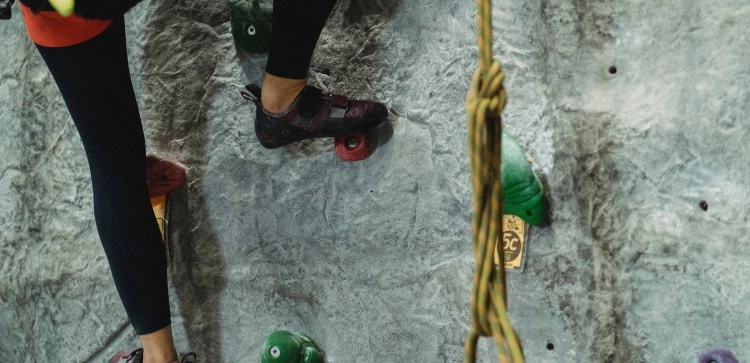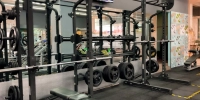The Role Of Strong Shoulders In Climbing

Shoulder strength often stands as the unsung hero in the world of climbing, quietly contributing to every move, every hold, and every dynamic ascent. As climbers, we are very well aware of the importance of finger strength, balance, and technique, but, we often overlook the vital role shoulder strength plays, a role that deserves more attention. Let's take a look at why shoulder strength is so important in climbing, some climbing moves the heavily rely on it, and how it can significantly impact performance.
- The Power Behind Climbing Moves
- The Performance Boost
- The Consequences Of Weak Shoulders
- Nurturing Shoulder Strength Through Climbing
- Training For Shoulder Supremacy
- Recommended Exercises For Building Shoulder Strength For Climbing
- 1. Shoulder Press
- 2. Lateral Raises
- 3. Push-Ups
- 4. Resistance Band Exercises
- 5. Bent-Over Rows
- 6. Hanging Exercises
- 7. Dumbbell Rows
- 8. Yoga And Mobility Work
- 9. Shoulder Shrugs
- 10. Scapular Pull-Ups
- Commonly Asked Questions
- Can Strong Shoulders Help With Climbing Techniques?
- How Can Weak Shoulders Affect Climbing Performance?
- Are There Specific Exercises To Strengthen Shoulders For Climbing?
- Can Climbing Help Improve Shoulder Strength?
- Is Shoulder Strength Important For Injury Prevention?
- Community Questions · 0
The Power Behind Climbing Moves
Climbing involves a tapestry of intricate moves and sequences, and a good number of them rely on the engagement and stability of sturdy shoulders. Whether you're reaching out on an overhanging route, powering through a dyno, or holding steady on delicate slabs, shoulder strength anchors your control. With strong shoulders, you gain the ability to leverage holds, sustain body positions, and execute technically challenging sequences smoothly.
The Performance Boost
Shoulder strength isn't just about avoiding injury – it's a game-changer for climbing performance. A solid foundation of shoulder power enables you to climb with greater confidence and efficiency. You'll find yourself executing moves with controlled precision, and the once-daunting overhangs become conquerable challenges. Furthermore, strong shoulders provide an essential base for building endurance, as they assist in distributing the load more effectively throughout your body, reducing strain on individual muscle groups.
The Consequences of Weak Shoulders
Conversely, a lack of shoulder strength can severely hinder climbing progress. Moves that require dynamic reaches or controlled swings become stumbling blocks. Fatigue sets in faster as your shoulders struggle to support your weight and maintain balance. Overuse injuries, such as strains and tendonitis, may creep in due to compensating with other muscle groups. It's a reminder that climbing isn't solely about finger strength – a holistic approach that includes shoulder conditioning is key to consistent advancement.
Nurturing Shoulder Strength through Climbing
The beauty of climbing lies in its ability to improve the very muscles needed to excel. As you climb, your shoulders adapt and develop strength through a variety of movements. Engaging in routes that challenge your shoulder stability and endurance naturally fosters growth. Moreover, climbing demands a balanced use of both pulling and pushing movements, contributing to well-rounded shoulder development.
Training for Shoulder Supremacy
While climbing itself contributes to shoulder strength, targeted exercises can accelerate progress. Incorporate exercises that emphasize shoulder stability, such as shoulder presses, lateral raises, and push-ups. Resistance band exercises can mimic the demands of climbing, enhancing shoulder mobility and strength. Always prioritize proper form to prevent injury, and gradually increase resistance and intensity.
Recommended Exercises for Building Shoulder Strength for Climbing
To bolster your shoulder strength for climbing, incorporating targeted exercises into your training regimen can make a substantial difference. These exercises focus on enhancing shoulder stability, mobility, and endurance.
1. Shoulder Press
This classic exercise targets the deltoid muscles, improving overall shoulder strength. Start with lighter weights and gradually increase as you become more comfortable.
2. Lateral Raises
Lateral raises work on the lateral deltoids, which contribute to shoulder stability and controlled movement. Use light dumbbells or resistance bands for effective results.
3. Push-Ups
Standard push-ups engage your chest, triceps, and shoulders. Variations like diamond push-ups or push-ups with elevated feet emphasize shoulder strength.
4. Resistance Band Exercises
Resistance bands are versatile tools for simulating climbing movements. Incorporate exercises like lateral pulls, internal and external rotations, and band pull-aparts.
5. Bent-Over Rows
This exercise not only engages your back but also works your rear deltoids, enhancing overall shoulder stability.
6. Hanging Exercises
Hanging from a pull-up bar or hangboard engages your shoulders and helps improve grip strength, endurance, and stability.
7. Dumbbell Rows
Dumbbell rows target your upper back and rear deltoids, crucial for maintaining balance and control during climbs.
8. Yoga and Mobility Work
Yoga poses and mobility exercises like arm circles, shoulder stretches, and wall slides can improve shoulder flexibility and range of motion.
9. Shoulder Shrugs
Shoulder shrugs strengthen the trapezius muscles, enhancing your ability to stabilize your shoulders during climbs.
10. Scapular Pull-Ups
Focus on scapular engagement by performing pull-ups with an emphasis on retracting and depressing your shoulder blades.
Commonly Asked Questions
Can strong shoulders help with climbing techniques?
For sure! Having robust shoulder strength makes a real difference in nailing climbing techniques. It's like having a solid base that lets you control your moves precisely. When your shoulders are strong, you can execute each move with a certain finesse that's hard to achieve otherwise. It's all about that controlled power, making your climbs smoother and more effective. So, in short, yes, strong shoulders are a game-changer for mastering climbing techniques.
How can weak shoulders affect climbing performance?
When your shoulders aren't quite up to the task, it can really throw a wrench into your climbing game. Picture this: reaching holds becomes a struggle, maintaining your body tension feels like walking on a tightrope, and those dynamic moves? They can feel like trying to catch a speeding train. In a nutshell, weak shoulders can put the brakes on your climbing performance by making even the basics a bit of a challenge.
Are there specific exercises to strengthen shoulders for climbing?
Absolutely! If you're looking to amp up those shoulder muscles for climbing, there are some specific exercises that can do wonders. Think about including shoulder presses to really target those muscles, lateral raises for some extra stability, and don't forget about resistance band exercises – they're like a secret weapon for building up those crucial shoulder muscles that play a big role in climbing.
Can climbing help improve shoulder strength?
As you navigate the routes and tackle different holds, you're actually engaging your shoulder muscles in a variety of ways. It's like a sneaky strength training session. So, to answer your question, yes, climbing is a natural way to amp up your shoulder strength and stability.
Is shoulder strength important for injury prevention?
Having strong shoulders isn't just about climbing performance – it's like a shield against injuries. When your shoulders are solid, they help distribute your body weight more evenly during climbs. It's like having a safety net that prevents overuse injuries and strains from sneaking up on you. Plus, strong shoulders help maintain your balance, which is a big deal in climbing.











